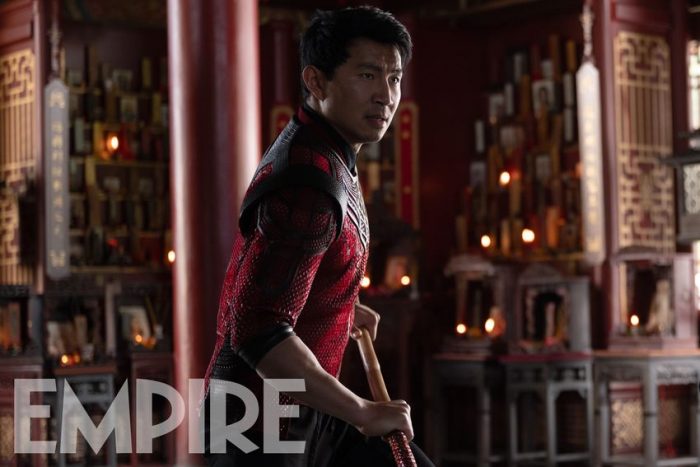How 'Black Panther' Paved The Way For 'Shang-Chi,' According To Kevin Feige
Shang-Chi and the Legend of the Ten Rings marks the point where Marvel's finally ready to acknowledge the existence of Asians. Responsible for decade upon decade of countless meaningful and invaluable contributions to cinema throughout the history of the medium, the Asian diaspora is finally getting its first major share of the superhero spotlight in over 13 years of the franchise's box office dominance.
Marvel's very proud of this and, to hear them speak of it, this wouldn't have been possible without the release of Black Panther — another long overdue superhero film that became a pop culture sensation simply tapping into an audience starved for representation. Really makes you think, huh?
New Shang-Chi Image
 Empire debuted new images for Shang-Chi and the Legend of the Ten Rings, giving us a closer look at the costume worn by Simu Liu, Marvel's first Asian superhero. And it's been a long time coming for Marvel to get here, though the studio had reportedly been considering a Shang-Chi adaptation for years. It wasn't until 2018's Black Panther that Shang-Chi could really become a reality, according to Marvel Chief Creative Officer Kevin Feige.
Empire debuted new images for Shang-Chi and the Legend of the Ten Rings, giving us a closer look at the costume worn by Simu Liu, Marvel's first Asian superhero. And it's been a long time coming for Marvel to get here, though the studio had reportedly been considering a Shang-Chi adaptation for years. It wasn't until 2018's Black Panther that Shang-Chi could really become a reality, according to Marvel Chief Creative Officer Kevin Feige.
"I remember seeing a viral video when the Black Panther poster first came out. It was some young men in a movie theatre overwhelmed with excitement at seeing the poster, and it was moving because people were excited about the movie we were making. But it was also a harsh realization that they were reacting that way because they had not seen it before. So Panther really coalesced the notion of, 'Everybody deserves to see themselves portrayed in these larger-than-life ways.'"
Acclaimed filmmaker Destin Daniel Cretton, best known for writing and directing smaller, quieter efforts such as the fantastic Short Term 12 (featuring a fresh-faced Brie Larson among its exceptional cast) or Just Mercy (which coincidentally stars Black Panther alum, Michael B. Jordan). Shang-Chi marks his first move into blockbuster filmmaking, but his focus is still as intimate, personal, and culturally-specific as ever.
"I grew up with Bruce Lee and Jackie Chan and Jet Li. But I haven't seen a hero on screen that really walks and talks like me, dresses like me, listens to the music that me and my friends listen to; somebody truly Asian-American. And that was what was really exciting to me, to create something that just shows the Asian-American experience through the eyes of a budding superhero."
The man who plays Shang-Chi, Simu Liu, has a similarly thoughtful approach to taking on the responsibility as the MCU's first Asian-American superhero. In a stroke of irony, Liu has suited up as a Marvel hero before...but only unofficially, dressing as Spider-Man for children's birthday parties. Liu describes the experience and how it affected his preparation for the role of Shang-Chi, "As an Asian man, I could never show my face. It was only once I put the mask on that the illusion of the superhero would be sold. The moment that I took it off, nobody would ever think I could be that. That's something I was keenly aware of."
Reflecting on Representation
Without disregarding the well-meaning intent behind Feige's words, that particular quote can't help but reflect on a very uncomfortably ignorant outlook. Sort of like how it's unnecessary for anyone to start off a sentence with "As a father of daughters..." when talking about women deserving fundamentally equal treatment, it's hard not to feel like this quote suggests that the idea of audiences starving for their own personal representation simply hadn't crossed any decision-maker's mind until these viral videos and social media posts cropped up in early 2018.
This is the kind of mindset that certainly explains why it took so long for Black Panther, Shang-Chi, and the recently-released Black Widow to find their way to audiences who've long clamored for these sorts of blockbuster movies. Excuses can be made regarding notoriously difficult executive Ike Perlmutter, to be sure, but Disney's bizarre and regressive treatment of the MCU's first major female hero is still an ongoing situation. The buck doesn't stop at any one person, as convenient a narrative as that might be.
In any case, Shang-Chi and the Legend of the Ten Rings releases in theaters (and Disney+ as well) on September 3, 2021.

